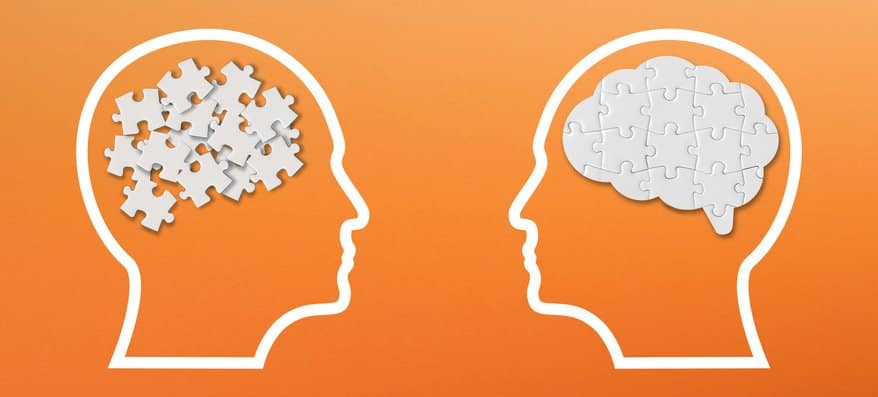Mental and cognitive problems that cause difficulties in reasoning, planning, judgement, memory and other thought processes are known as vascular dementia. These problems come about because of brain damage and impaired blood flow to the brain.
Your loved one can develop vascular dementia after a stroke blocks an artery in their brain. But, it’s not always the case that a stroke leads to vascular dementia, it depends on the severity and location of the stroke.
Vascular dementia can also develop due to other conditions that damage blood vessels and reduce circulation, depriving their brain of vital oxygen and nutrients.
Diabetes, high blood pressure, high cholesterol, and smoking are some factors that increase the risk of stroke and heart disease which then increases the risk of dementia. So, controlling these factors can reduce the risk of developing vascular dementia.
Early Symptoms Of Dementia – Sudden Worsening Of Dementia Symptoms
The earliest symptoms of dementia include:
- Slowed thinking
- Finding it difficult to plan daily life activities
- Having difficulty paying attention to things
- Abrupt changes in behaviour or mood
- Lack of enthusiasm
Other warning signs of dementia include problems with memory and language, however these problems are also associated with Alzheimer’s disease.
It’s important to remember that these problems can be hard to detect in the early stages of dementia, and can be mistaken for something else, such as depression.

Later Symptoms Of Dementia
As vascular dementia progresses, unfortunately its symptoms only worsen. The condition of the patient declines slowly, but it is also possible that their symptoms worsen suddenly in a month or two.
If your loved one is in the later stages of dementia their symptoms may vary depending on the damaged part of the brain. Symptoms may include:

- Significantly slowed rate of thought and expression
- Having feelings of confusion and disorientation
- Difficulty in finding the right words
- Abrupt changes in personality
- Lack of empathy
- Hallucinations
- Paranoia
- Depression, mood swings, and lack of interest or enthusiasm
- Declining physical abilities
Sudden Worsening Of Dementia Symptoms
Vascular dementia symptoms can worsen over time or suddenly. Your loved one can sadly suffer quite big steps in decline, but it’s really difficult to predict its progression. If you suspect your loved one has any dementia symptoms, you should immediately take them to a specialist to get an accurate diagnosis.
The worsening of symptoms also depends on the type of dementia the patient has and what part of the brain is affected by the disease.

- A stroke can cause the blockage of a brain artery. Strokes that block arteries usually have a range of symptoms, including vascular dementia. But some strokes do not cause any noticeable symptoms.
- Mini strokes / TIA the risk of dementia increases with the number of strokes or TIA (Transient ischemic attack, i.e. a mini stroke) that occur over time. Mini strokes, whether silent or apparent, can cause blood clots in the brain. One type of vascular dementia involving many strokes is called multi-infarct dementia.
- Brain haemorrhage is another condition that can cause dementia. Brain haemorrhage occurs due to high blood pressure, which weakens a blood vessel and causes bleeding. This bleeding causes damage. It can also form a build-up of protein in small blood vessels that occurs with ageing, weakening them over time and affecting the blood supply to the brain.
- Conditions that narrow or inflict long-term damage to your brain blood vessels can also lead to vascular dementia. These are caused by ageing, high blood pressure, abnormal ageing of blood vessels, diabetes.
How Is Vascular Dementia Diagnosed?
If you suspect your loved one might have vascular dementia, you should talk to their GP as soon as possible. The GP will initially do a check-up and talk to your loved one about their symptoms.
The GP will also check their medical history and carry out routine tests, such as blood pressure blood tests, physical examination, and cognitive ability tests.
It’s also possible that the GP may refer them to a specialist or memory clinic. The specialist will do a CT or MRI scan of their brain to check for any abnormalities. An accurate diagnosis can take a little time but it’s important to get the most detailed diagnosis possible, so you can get a personalised treatment plan.
Outlook For Vascular Dementia

Therefore, your loved one will require personalised care and support to maintain their quality of life. Home care services can really help when it comes to caring for a dementia patient so they can stay happily and safely in the comfort of their own home.
Although treatment can help, vascular dementia can significantly shorten life expectancy. It can be difficult to predict how dementia will progress in a patient, therefore it’s important to set up the right care and support both physically and mentally from the day of diagnosis.
NHS, social services and voluntary organisations offer support but the process and waiting time can be significant so reaching out for help is important for your loved one, but equally important for you as it can be a particularly worrying time.
As a carer for a family member, it’s challenging and draining. You need to think about the long-term plan of how you can stay in the family environment for as long as you and your loved one wish without you becoming burned out.
Home Care Services For Your Loved One With Dementia
Caring for your loved one diagnosed with dementia can leave you exhausted and impact your well-being. You shouldn’t feel ashamed in reaching out for professional home care services for your loved one. We hear a lot from sons, daughters, next of kin who say they wish they’d reached out sooner.
At Abney and Baker, we provide professional home help and personal care for individuals with vascular dementia. Our home carers ensure your loved one feels safe, supported and happy. With help and support it gives you peace of mind that your loved one is in safe and caring hands and seeing a regular friendly face.
Find out more about our award-winning Companionship Support Services in Melksham and Home Care Service in Melksham, Bath, Chippenham and surrounding areas here: https://www.abneyandbaker.com/home-care-services-melksham
Helping your loved one to continue living independently and confidently in their own home.
By providing a range of support at home, we’re helping many clients across Bath & North East Somerset and West Wiltshire retain their independence and stay in control in the comfort of their own homes.
Remember we’re always here if you want to chat about your care options. Just get in touch:
Call 0333 043 4880 – Email enquiries@abneyandbaker.com – Book a call here














